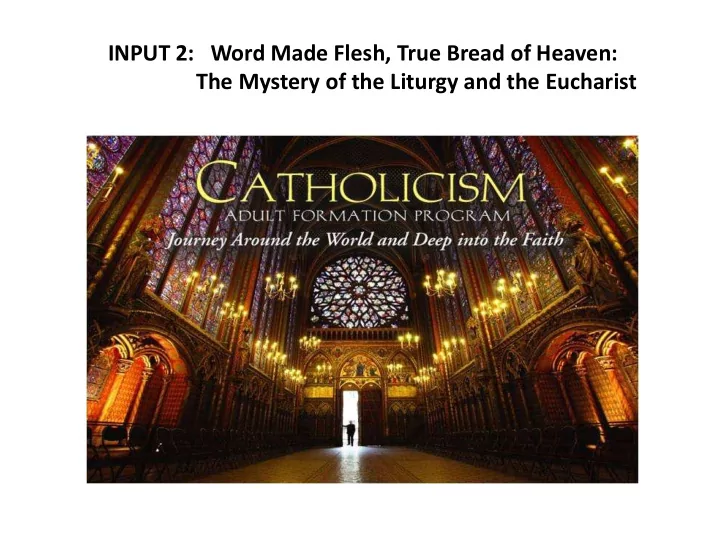

INPUT 2: Word Made Flesh, True Bread of Heaven: The Mystery of the Liturgy and the Eucharist
Culture of Encounter “I have been crucified with Christ; and it is no longer I who live but Christ who lives in me. And the life I now life in the flesh I live by faith in the Son of God who loved me and gave himself for me” (Gal. 2:20) • The Primary Encounter of a Missionary Disciple is with the Lord – “‘. . . before I formed you in the womb I knew you, and before you were born I consecrated you. . . . You shall go to all whom I send you and you shall speak whatever I command you. Do not be afraid of them for I am with you to protect you,’ says the Lord” (Jer 1:5, 7-8). • The Primary Mandate of a Missionary Disciple is from the Lord - Not me then, but Christ living in me who causes the growth and prosperity. “"What I tell you in the darkness, speak in the light; and what you hear whispered in your ear, proclaim upon the housetops” (Matt. 10:27). “Go therefore and make disciples of all the nations baptising them . . . and teaching them to obey everything that I have commended you” (Matt 28: 19-20). • “I am sending you out like sheep in the midst of wolves; so be wise as serpents and innocent as doves” (Matt 10:16). • “. . . Do not worry about how you are to defend yourself or what you are to say: for the Holy Spirit will teach you at that very hour what you ought to say” (Luke 12:11-12)
Do not be afraid – Christ is the Teacher, we are His ambassadors, communicating God’s word and not some human thinking (cf. 1Thess 2:13). • St Paul: “I planted, Apollos watered, but God gave the growth. So neither the one who plants nor the one who waters is anything, but only God who gives the growth” (1Cor. 3:6-7). It should be a great liberation to realise we are not in charge – we are the conduits through which God’s grace flows. • We ought to be be able to apply to ourselves the mysterious words of Jesus: "My teaching is not mine, but his who sent me."(John 7:16); and St Paul: "I received from the Lord what I also delivered to you"(1Cor. 11:23). • This detachment from self is the corner stone of a culture of encounter: "My teaching is not mine!” – I approach people on the basis that I am a joyful messenger of faith, hope and love , confident that the truth stands on its own merits and that the truth will set them free (John 8:32). • I am a conduit of the truths of the faith – not an inventor of human proshibitions and sanctions and
CO-WORKERS WITH THE TRUTH (3 John 1:8) Pilate asked: “So you are a King then? Jesus answered, “You say that I am a king. For this I was born, and for this I came into the world, to testify to the truth. “… we will speak the truth in love, growing in every way Everyone who belongs to the truth listens to my more and more like Christ, who is the head of his body, voice” (John 18:37-38). the church. . . Speak the truth to one another, since we are all parts of one another” (Eph 4:15, 25).
A Culture of Formation A Culture of Formation gives us the capacity to . . . observe everything in the surrounding culture . . . assimilate what is good, truth, and beautiful . . . reject what is evil, false and deceptive In Catechesi Tradendae , 43 – on the Catechesis of Adults, Pope St John Paul said: “[Adult Faith Formation] is the principal form of catechesis , because it is addressed to persons who have the greatest responsibilities and the capacity to live the Christian message in its fully developed form.”
A Permanent Culture of Formation In Catechesi Tradendae , 43 – on the Catechesis of Adults, Pope St John Paul said: The world, in which the young are called to live and to give witness to the faith which catechesis seeks to deepen and strengthen, is governed by adults. The faith of these adults too should continually be enlightened, stimulated and renewed, so that it may pervade the temporal realities in their charge. Thus, for catechesis to be effective, it must be permanent , and it would be quite useless if it stopped short at the threshold of maturity, since catechesis, admittedly under another form, proves no less necessary for adults.
Chat and share for a few moments: • What forms you in faith? • How does your Christian Formation serve you? • How do you relate to the shifting culture of our society? • Proverbs 27: 17 says “Iron sharpens iron, and one person sharpens another.” What do you think? • What about this statement – “The next best thing to being wise oneself is to live in a circle of those who are” (C.S. Lewis).
Recommend
More recommend